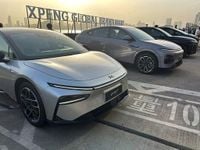In a bold move that underscores its commitment to innovation, Xpeng, the Chinese automotive brand, is redefining the landscape of electric vehicles (EVs) and artificial intelligence (AI). On April 29, 2025, during a press conference in Jakarta, Xpeng Chairman and CEO He Xiaopeng announced the company's latest advancements, emphasizing that Xpeng is not just another automotive company but a pioneer in AI-based mobility solutions.
Through its ambitious AI Tech Tree, Xpeng is building an integrated ecosystem that combines groundbreaking technologies such as the AI Supercharging 5C battery, the AI Turing chip, and advanced robotics. "Through our AI Tech Tree, Xpeng builds an integrated ecosystem that combines innovations such as the AI Supercharging 5C battery, the AI Turing chip, and IRON robotics. All of this is designed to create smart mobility solutions that are able to learn, adapt, and improve driving experience," Xiaopeng stated.
At the heart of this technological leap is the introduction of the latest generation "AI Brain" World Foundation Model. This revolutionary model boasts 35 times more parameters than traditional Vision-Language-Action (VLA) models, representing a significant advancement in automotive intelligence. The self-optimizing capabilities of the AI Brain allow it to adapt in real-time to various road conditions, paving the way for broader applications in AI-driven vehicles, robotics, and even flying cars.
Among the highlights of this announcement is the launch of the Xpeng P7+, touted as the world's first car equipped with AI Supercharging 5C technology. This cutting-edge technology enables users to travel an impressive 420 kilometers after just 10 minutes of charging, with an energy efficiency of 12.7 kWh per 100 kilometers.
Following its official launch on April 15, 2025, in Hong Kong, Xpeng has commenced global shipments of its latest MPV model, the XPENG X9 2025. This model features 496 refinements, including zero-gravity seats and high-level autonomous driving technology. In a remarkable feat, the X9 garnered over 6,000 orders within just seven days of its launch, setting a new record for pure electric MPVs.
During the first quarter of 2025, Xpeng reported shipping a total of 94,008 vehicles, a staggering 370 percent increase compared to the same period last year, with 7,615 units destined for international markets. This surge in sales underscores Xpeng's growing influence in the global EV market.
At the recent Auto Shanghai 2025, Xpeng also showcased its IRON humanoid robot, which stands at 178 cm tall and boasts 22 degrees of freedom in its hand movements. The robot's capabilities range from engaging in natural conversations, supported by AI's smart cockpit, to performing delicate tasks with high precision. This innovation illustrates Xpeng's ambition to extend its technological prowess beyond the automotive sector.
Xpeng is not resting on its laurels as it looks toward the future. The company is eyeing 2026 for the launch of its Electric Vertical Take-Off and Landing vehicle (EVTOL), commonly referred to as a flying car. During its recent international brand carnival in Hong Kong, executives confirmed that the manufacturing plant for the EVTOL is expected to be completed by the third quarter of 2025, with customer deliveries slated for 2026.
Preorder prices for the EVTOL and its accompanying Land Aircraft Carrier are anticipated to start around $300,000 (approximately P16.92 million before taxes) in China. While Xpeng's flying car has been the subject of speculation regarding its debut, the company remains committed to prioritizing its home market before expanding into other regions, including the Middle East.
In addition to its flying car, Xpeng is heavily invested in the development of its humanoid robot, named Iron. The company envisions Iron as a versatile assistant capable of performing heavy lifting in factories and serving as receptionists or sales representatives at dealerships. Although Xpeng has not disclosed the current stage of Iron's development, mass production is targeted for 2026, with plans to deploy these robots in Xpeng offices and dealerships.
Iron will also serve as the primary platform for Xpeng’s Tianji AI operating system, which is designed to enhance functionality across multiple applications. The same AI OS will eventually be integrated into Xpeng’s vehicles for autonomous driving and driver-assistance features, further solidifying the brand's commitment to innovation.
As Xpeng continues to push the boundaries of technology, the company remains focused on creating a comprehensive ecosystem that enhances mobility through AI, robotics, and flying vehicles. The integration of these technologies promises to offer consumers unprecedented freedom in their daily commutes and travel experiences.
While Xpeng has yet to officially launch in the Philippines, it is clear that the company is laying the groundwork for a future where AI-powered mobility becomes the norm. With its ambitious plans for the EVTOL, humanoid robots, and advanced EVs, Xpeng is poised to make a significant impact on the global automotive landscape.
As the company gears up for the future, the question remains: will its innovative approach resonate with consumers in other markets? Only time will tell, but Xpeng's commitment to redefining mobility through technology is undoubtedly setting the stage for exciting developments ahead.




